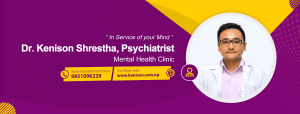Table of Contents
Our Mental Health Services:

Dr. Kenison Shrestha’s Mental Health Clinic
Welcome to Dr. Kenison Shrestha’s Mental Health Clinic, where we offer a range of mental health services to help you live your best life.
At our clinic, we offer a variety of services to meet your mental health needs. Our services include psychiatric evaluations, medication management, individual therapy, couples therapy, family therapy, and group therapy. We also offer specialized services for issues such as trauma, addiction, and eating disorders.
Psychiatric evaluations are an important part of our mental health services. During a psychiatric evaluation, our experienced psychiatrists will assess your symptoms, medical history, and other factors to make an accurate diagnosis and develop a treatment plan. This may include medication management, therapy, or a combination of both.
Medication management is another key aspect of our mental health services. Our psychiatrists are experts in the latest medications and can work with you to find the medication that is best suited for your needs. We will monitor your progress and adjust your medication as needed to ensure optimal results.
In addition to medication management, we offer a variety of therapy services to meet your needs. Individual therapy is a one-on-one therapy session with a licensed therapist, where you can work through your challenges and develop coping strategies. Couples therapy is designed to help couples improve communication, resolve conflicts, and strengthen their relationship. Family therapy can help families navigate challenges and improve relationships.
We also offer group therapy, which can be a helpful way to connect with others who are going through similar challenges. Group therapy provides a safe and supportive environment where you can learn from others and gain new perspectives.
At Dr. Kenison Shrestha’s Mental Health Clinic, we are committed to providing high-quality mental health services to help you achieve your goals. We believe that everyone deserves access to compassionate, effective care, and we are dedicated to helping you live your best life. Thank you for considering our clinic for your mental health needs.
Mental health services

Anxiety disorder treatment
Anxiety disorders are a group of mental health conditions characterized by excessive and persistent feelings of worry, fear, and unease. Treatment for anxiety disorders typically involves a combination of therapy and medication.
learn more

Depression treatment
Depression is a mental health disorder characterized by persistent feelings of sadness, hopelessness, and loss of interest in life. Treatment for depression typically involves a combination of therapy and medication.
learn more

bipolar disorder treatment
Bipolar disorder, also known as manic-depressive illness, is a mental health disorder characterized by extreme mood swings, including episodes of mania (abnormally elevated or irritable mood) and depression. The treatment for bipolar disorder typically involves a combination of medication and therapy.
learn more

OCD treatment
Obsessive-compulsive disorder (OCD) is a mental health disorder characterized by recurrent, unwanted thoughts, ideas, or sensations (obsessions) that drive an individual to perform repetitive behaviors or mental acts (compulsions) in response. The treatment for OCD typically involves a combination of therapy and medication.
learn more

Schizophrenia/ psychosis treatment
Schizophrenia is a severe mental health disorder characterized by a wide range of symptoms, including hallucinations, delusions, disordered thinking, and emotional disturbances. The treatment for schizophrenia typically involves a combination of medication and therapy.
learn more

addiction treatment
Addiction is a complex condition characterized by a compulsive use of a substance or engagement in a behavior despite negative consequences. Treatment for addiction typically involves a combination of therapy and medication.
learn more

insomnia treatment
Insomnia is a condition characterized by difficulty falling asleep, staying asleep, or getting restful sleep. Treatment for insomnia typically involves a combination of lifestyle changes and therapy.
learn more

sexual dysfunction treatment
Sexual dysfunction refers to difficulty experiencing sexual desire or difficulty with sexual performance, such as difficulty getting or maintaining an erection (erectile dysfunction) or difficulty reaching orgasm (anorgasmia). Treatment for sexual dysfunction typically involves a combination of therapy and medication.
learn more

eating disorder treatment
Eating disorders are a group of mental health disorders characterized by abnormal eating behaviors, such as restrictive eating, binge eating, or purging. The treatment for eating disorders typically involves a combination of therapy, medication, and nutritional support.
learn more

headache treatment
Headaches are a common condition characterized by pain in the head or face. Treatment for headaches typically involves a combination of medication and lifestyle changes.
learn more

relaxation exercise
Relaxation exercises are techniques that can help reduce stress and tension in the body, improve overall well-being, and promote relaxation.